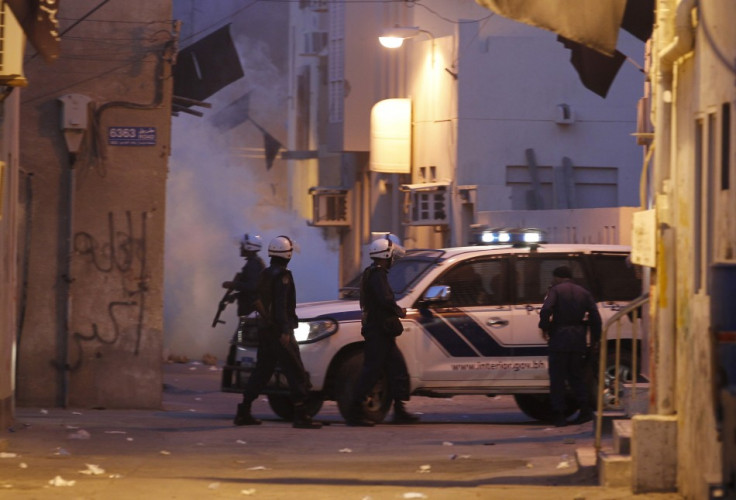Is Bahrain Headed for Civil War?
As the King of Bahrain arrives in the UK to celebrate the Queen's Diamond jubilee, protesters in Bahrain continue to take to the streets in protest of the lack of political reforms and human rights abuses.

As the King of Bahrain arrives in the UK to celebrate the Queen's Diamond jubilee, protesters in Bahrain continue to take to the streets in protest of the lack of political reforms and human rights abuses.
Despite more than a year of protests and repeated accusations of sectarian-led discrimination by the regime, corruption and human rights abuses, Bahrainis activists and opposition leaders say most of their demands are brushed aside.
The regime in contrast insists it is committed to reforms.
Following a brutal crackdown on protesters between February and March 2011, the King of Bahrain Hamad ibn Isa Al Khalifa, appointed the Bahrain Independent Commission of Inquiry.
Authorities also hired the former assistant commissioner of the Metropolitan Police John Yates and Former Philadelphia and Miami police chief John Timoney to overhaul Bahrain's police service to ensure it meets international human rights standards.
"This is not a new pattern", Abduljali Khalil Ebrahim, the head of Al Wefaq parliamentary bloc, Bahrain's largest opposition movement told the IBTimes UK.
"Britain ruled Bahrain for 50 years and thus still has strong link to the country. Yates is not the first British advisor to be hired by the regime. Charles Belgrave was hired by the royal family as Chief Administrator from 1925 to 1956. Ian Henderson was at the head of the intelligence services for 30 years. Throughout all that time the people of Bahrain have repeatedly taken to the streets to protest against injustice, torture and excessive use of force" Khalil Ebrahim said.
The protesters' demands, he insist are essentially political. They want more democracy, freedom of speech, an elected government and more transparency.
Despite pictures, interviews, demonstrations and videos posted online by activists, the International community has failed to take a strong stance and step up pressure against the regime, contrary to strong support for other Arab countries where upheaval emerged.
"We are in touch with UK and US diplomats. Though they say they understand our demands, in contrast with countries such as Syria where they did not have strong diplomatic relations, they do enjoy a good relationship with the Bahraini regime and bilateral trade. They also have Saudi Arabia as an ally and the Saudi regime supports Bahrain."
Bahrain, Syria, and Iran
Prime Minister David Cameron recently warned when asked to comment on the situation in Bahrain and the UK's position "Bahrain is not Syria."
"Bahrain is not Syria, it is true", Khalil Ebrahim said. "But what will happen if the opposition becomes militarised? The protests started peacefully in Syria. It is the regime's systematic human rights abuses and violence that created the insecurity which in turn led to protesters and army defectors to arm themselves."
Protests in Bahrain also started off peacefully. Opposition members have and continue to call for the demonstrations to remain peaceful. Violence they say will not help soften the regime's attitude or accelerate reforms protests.
In recent months however more and more petrol bombs have been thrown at the police, tyres are burnt and confrontations between the youths and the security forces have become more numerous.
Bahrain is also not isolated. Surrounded by Gulf States but also Iran and Iraq, it is located in a high-tension zone. With Iraq struggling to stop sectarian violence between Shia and Sunni and an Iranian government increasingly becoming preoccupied by the Bahraini situation, the picture is complex.
While protests against the Bahraini King's visit to the UK have been organised in London, Windsor and Bahrain, thousands of protesters also took to the streets in Iran to protest against a plan for Bahrain and Saudi Arabia to create a stronger partnership.
"The opposition rejects the Bahrain-Saudi Union. Protesters have also clearly rejected the move. As opposition leaders we at least demand the royal family to agree to a referendum before such plan can be established. "
What's next for Bahrain?
What's next for Bahrain then? Will the protesters one day get their elected government? The response here is in two-fold.
"One of our main fears is that the youths' frustration and anger increase. Many have had relatives or friends jailed, tortured, killed. Their mosques have been destroyed. The pressure is building up. There is a pressing need for a political solution to be found. We need real reforms. The King recently amended item 46 of the constitution, as part of a set of reforms. He will continue to appoint the Prime Minister who will then be tasked with submitting his government programme to the legislative powers. However MPs do not have any say in the constitution of the government, neither do the people. It does not answer the protester's demands."
Bahrain opposition members warn finding a political solution is becoming a necessity to preserve regional stability
Despite the obstacles, Khalil Ebrahim says he remains confident protesters will continue to take to the streets until their demands are met.
"The most important is to remain cohesive as an opposition movement. The sectarian-based strategy employed by the regime should not divide us. We demand change, democracy, rights and freedom for all Bahraini. "
© Copyright IBTimes 2024. All rights reserved.





